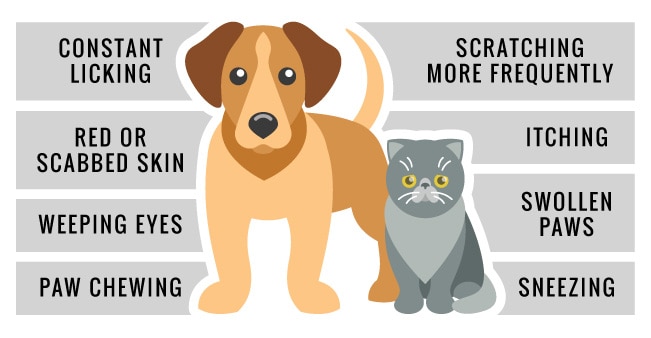Unlike humans whose allergy signs usually involve the respiratory tract, symptoms of dog allergies and cat allergies more often take the form of skin irritation or inflammation – a condition called allergic dermatitis.
What are the signs of allergies in pets?
General symptoms of allergies in dogs and cats are:
- extensive itching
- red, irritated skin
- obsessive licking, including the feet.
- hair loss
- hot spots
- skin rash or hives
How common are allergies in dogs?
Unfortunately, allergies are quite common in dogs of all breeds and backgrounds. Most allergies appear after the pet is six months of age, with the majority of affected dogs over age one or two.
Are allergies inherited?
Pets are not born with allergies, but they can be genetically prone to develop an overactive immune system. Then after repeated exposure to an allergen such as house dust, mold spores, or pollen, the immune system starts to overreact to these things. The inflammation causes damage to the skin or other tissues which cause the symptoms that you see.
What are the common allergy-causing substances (allergens)?
A very large number of substances can act as allergens. Most are proteins of insect, plant, or animal origin, but small chemical molecules can also cause allergy. Examples of common allergens are pollens, mold spores, dust mites, shed skin cells (similar to pet allergies in humans), insect proteins such as flea saliva, and some medications.
What are the different types of allergy?
There are several ways of classifying allergies. Some examples of classifications include:
- Type of allergen: flea allergy, food allergy
- Route the allergen takes into the body: inhalant allergy, skin contact allergy, or food allergy
- Time it takes for the immune reaction: immediate-type hypersensitivity, also called anaphylaxis or shock, and delayed-type hypersensitivity
- Clinical signs: allergic dermatitis or allergic bronchitis
Can allergies be cured?
Allergies can be managed, but usually are not cured. Sometimes they are seasonal, for instance if they are pollen allergies, but other times they require year-round management. If you suspect your dog or cat is uncomfortable due to allergies, please give us a call.
